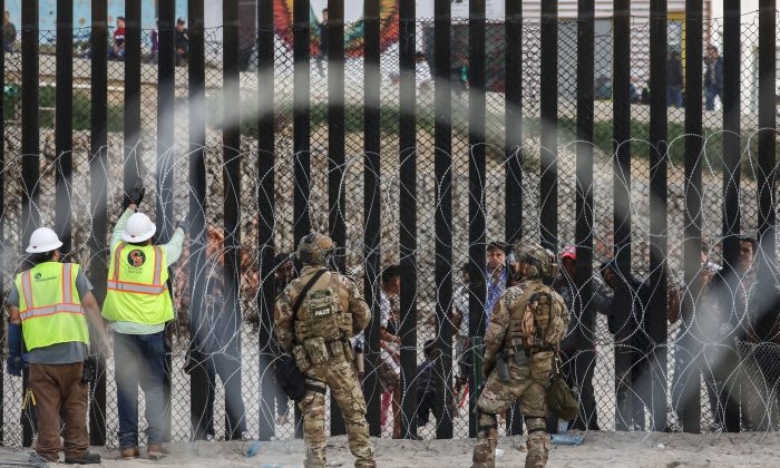Three U.S. Army soldiers stationed at Fort Cavazos, Texas, are facing federal charges for allegedly participating in a human smuggling operation near the U.S.-Mexico border. The arrests, announced by U.S. Attorney Jaime Esparza for the Western District of Texas, underscore the growing issue of human smuggling in border regions, including the involvement of U.S. citizens.
The soldiers—Emilio Mendoza Lopez, Angel Palma, 20, and Enrique Jauregui, 25—were implicated in the smuggling scheme after law enforcement officers conducted a vehicle stop near Presidio, Texas, on November 27. Presidio, located roughly 500 miles southwest of Dallas, is a known border crossing point.
During the stop, authorities discovered Mendoza Lopez, a Mexican national, and two Guatemalan nationals inside the vehicle. Palma, identified as the driver, reportedly fled the scene but was apprehended later. According to federal investigators, Mendoza Lopez and Palma had allegedly traveled from Fort Cavazos to Presidio with the intent of transporting undocumented noncitizens.
Further investigations revealed that Jauregui acted as the operation’s recruiter and coordinator. Authorities found evidence of communication between the three soldiers in messages extracted from Palma’s phone, detailing their roles and collaboration in the smuggling effort.
Mendoza Lopez was arrested at the scene, while Palma and Jauregui were taken into custody on December 3 at Fort Cavazos. Mendoza Lopez remains in custody without bail, and his attorney, Shane Chriesman, expressed plans to secure bond for his client, stating, “Once I get discovery and have a chance to assess the case, we’ll develop a plan of attack.”
Palma and Jauregui are awaiting their first court appearance on Friday. The charges against the three soldiers are severe, reflecting the federal government’s intensified focus on combating human smuggling networks operating near the southern border.
The military has not yet disclosed the ranks of the accused soldiers, and Fort Cavazos has refrained from issuing a public statement about the arrests.
This case highlights the increasing prevalence of human smuggling operations in border areas and raises questions about the involvement of U.S. citizens, including members of the military. The U.S.-Mexico border has long been a hotspot for smuggling activities, with individuals and organized networks seeking to exploit vulnerabilities for financial gain.
What makes this case particularly troubling is the involvement of active-duty soldiers, individuals sworn to uphold the law and serve their country. Their alleged participation in illegal activities undermines public trust and draws attention to potential gaps in oversight within military ranks.
According to Esparza, the arrests are a reminder of the Justice Department’s commitment to addressing border-related crimes. “Mendoza Lopez and Palma allegedly traveled from Fort Cavazos to Presidio for the purpose of picking up and transporting undocumented noncitizens,” Esparza said in a statement.
The involvement of military personnel in smuggling operations is not unprecedented but remains rare. These cases often point to broader issues, such as economic pressures, exploitation by criminal networks, or lax monitoring within certain institutions. The military may now face scrutiny over how these soldiers managed to participate in such activities undetected until their arrest.
The arrest of Jauregui, described as the recruiter and facilitator, suggests a degree of planning and organization. It raises questions about whether the operation was an isolated incident or part of a larger network involving other personnel or civilians.
The southern border has been a focal point for national security and humanitarian concerns. While federal agencies, including Customs and Border Protection (CBP) and Immigration and Customs Enforcement (ICE), work to curtail illegal crossings and smuggling, cases like this reveal the complexities of the issue.
The Biden administration has sought to balance enforcement with humane immigration policies, but critics argue that persistent smuggling operations highlight the need for stronger measures and better resources for border security.
As the investigation continues, attention will likely turn to the broader implications of the soldiers’ actions and the role of U.S. citizens in aiding illegal border activities. If convicted, the soldiers could face severe penalties, including imprisonment and dishonorable discharge from the military.
For now, the arrests serve as a stark reminder of the challenges faced by law enforcement and military institutions in maintaining integrity and upholding the rule of law. The case underscores the importance of vigilance and accountability in addressing border-related crimes.
Whether this incident sparks further investigations into similar activities remains to be seen, but it is clear that the intersection of human smuggling and U.S. military involvement has opened a new chapter in the ongoing border security debate.


